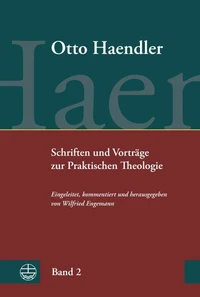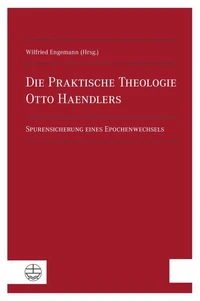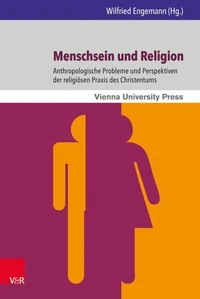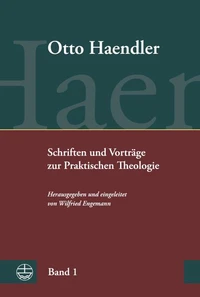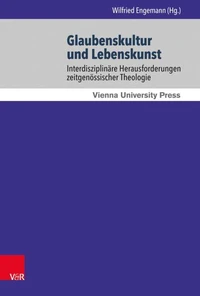Der Mensch ist anders. Anthropologie im Fokus des Pfarrberufs
Par :Formats :
Disponible dans votre compte client Decitre ou Furet du Nord dès validation de votre commande. Le format PDF est :
- Compatible avec une lecture sur My Vivlio (smartphone, tablette, ordinateur)
- Compatible avec une lecture sur liseuses Vivlio
- Pour les liseuses autres que Vivlio, vous devez utiliser le logiciel Adobe Digital Edition. Non compatible avec la lecture sur les liseuses Kindle, Remarkable et Sony
 , qui est-ce ?
, qui est-ce ?Notre partenaire de plateforme de lecture numérique où vous retrouverez l'ensemble de vos ebooks gratuitement
Pour en savoir plus sur nos ebooks, consultez notre aide en ligne ici
- Nombre de pages240
- FormatPDF
- ISBN978-3-374-07608-6
- EAN9783374076086
- Date de parution26/04/2024
- Protection num.Digital Watermarking
- Taille2 Mo
- Infos supplémentairespdf
- ÉditeurEvangelische Verlagsanstalt
Résumé
Menschen sind um ihres Lebens willen religiös, nicht um der Götter willen. Welche Erzählungen auch immer für eine Religion prägend werden, sie haben ihre Wurzeln in der von jedem Menschen zu bewältigenden Herausforderung, unter vorgegebenen Bedingungen ein nicht vorgegebenes Leben zu führen. Die Brauchbarkeit einer Theologie für das Verständnis, die Gestaltung und Bewertung religiöser Praxis steht und fällt daher mit ihrer Anthropologie.
Es gilt, in Theologie und Kirche von der latenten Diffamierung des Menschseins als Handicap eines Lebens aus Glauben Abstand zu nehmen. Wer an der religiösen Praxis des Christentums partizipiert, sollte die Erfahrung machen, als Mensch zum Vorschein zu kommen. Die Beiträge dieses Buches gehen der Frage nach, was das für den Ansatz der Praktischen Theologie und für Seelsorge, Predigt und Gottesdienst bedeutet. [Man is different.
Anthropology in the focus of the parish profession] Human beings are religious for the sake of their lives, not for the sake of gods. Whatever narratives become formative for a religion, they have their roots in the challenge to be met by every human being to lead a life that is not given under given conditions. The usefulness of a theology for understanding, shaping and evaluating religious practice therefore stands and falls with its anthropology.
In theology and church, it is necessary to refrain from the latent defamation of the human condition as a handicap of a life of faith. Whoever participates in the religious practice of Christianity should have the experience of appearing as a human being. The contributions in this book explore what this means for the approach of practical theology and for pastoral care, preaching and worship.
Es gilt, in Theologie und Kirche von der latenten Diffamierung des Menschseins als Handicap eines Lebens aus Glauben Abstand zu nehmen. Wer an der religiösen Praxis des Christentums partizipiert, sollte die Erfahrung machen, als Mensch zum Vorschein zu kommen. Die Beiträge dieses Buches gehen der Frage nach, was das für den Ansatz der Praktischen Theologie und für Seelsorge, Predigt und Gottesdienst bedeutet. [Man is different.
Anthropology in the focus of the parish profession] Human beings are religious for the sake of their lives, not for the sake of gods. Whatever narratives become formative for a religion, they have their roots in the challenge to be met by every human being to lead a life that is not given under given conditions. The usefulness of a theology for understanding, shaping and evaluating religious practice therefore stands and falls with its anthropology.
In theology and church, it is necessary to refrain from the latent defamation of the human condition as a handicap of a life of faith. Whoever participates in the religious practice of Christianity should have the experience of appearing as a human being. The contributions in this book explore what this means for the approach of practical theology and for pastoral care, preaching and worship.
Menschen sind um ihres Lebens willen religiös, nicht um der Götter willen. Welche Erzählungen auch immer für eine Religion prägend werden, sie haben ihre Wurzeln in der von jedem Menschen zu bewältigenden Herausforderung, unter vorgegebenen Bedingungen ein nicht vorgegebenes Leben zu führen. Die Brauchbarkeit einer Theologie für das Verständnis, die Gestaltung und Bewertung religiöser Praxis steht und fällt daher mit ihrer Anthropologie.
Es gilt, in Theologie und Kirche von der latenten Diffamierung des Menschseins als Handicap eines Lebens aus Glauben Abstand zu nehmen. Wer an der religiösen Praxis des Christentums partizipiert, sollte die Erfahrung machen, als Mensch zum Vorschein zu kommen. Die Beiträge dieses Buches gehen der Frage nach, was das für den Ansatz der Praktischen Theologie und für Seelsorge, Predigt und Gottesdienst bedeutet. [Man is different.
Anthropology in the focus of the parish profession] Human beings are religious for the sake of their lives, not for the sake of gods. Whatever narratives become formative for a religion, they have their roots in the challenge to be met by every human being to lead a life that is not given under given conditions. The usefulness of a theology for understanding, shaping and evaluating religious practice therefore stands and falls with its anthropology.
In theology and church, it is necessary to refrain from the latent defamation of the human condition as a handicap of a life of faith. Whoever participates in the religious practice of Christianity should have the experience of appearing as a human being. The contributions in this book explore what this means for the approach of practical theology and for pastoral care, preaching and worship.
Es gilt, in Theologie und Kirche von der latenten Diffamierung des Menschseins als Handicap eines Lebens aus Glauben Abstand zu nehmen. Wer an der religiösen Praxis des Christentums partizipiert, sollte die Erfahrung machen, als Mensch zum Vorschein zu kommen. Die Beiträge dieses Buches gehen der Frage nach, was das für den Ansatz der Praktischen Theologie und für Seelsorge, Predigt und Gottesdienst bedeutet. [Man is different.
Anthropology in the focus of the parish profession] Human beings are religious for the sake of their lives, not for the sake of gods. Whatever narratives become formative for a religion, they have their roots in the challenge to be met by every human being to lead a life that is not given under given conditions. The usefulness of a theology for understanding, shaping and evaluating religious practice therefore stands and falls with its anthropology.
In theology and church, it is necessary to refrain from the latent defamation of the human condition as a handicap of a life of faith. Whoever participates in the religious practice of Christianity should have the experience of appearing as a human being. The contributions in this book explore what this means for the approach of practical theology and for pastoral care, preaching and worship.



